|
|
|
Sort Order |
|
|
|
Items / Page
|
|
|
|
|
|
|
| Srl | Item |
| 1 |
ID:
191904


|
|
|
|
|
| Summary/Abstract |
International organizations come in many shapes and sizes. Within this institutional gamut, the multipurpose multilateral intergovernmental organization (MMIGO) plays a central role. This institutional form is often traced to the creation of the League of Nations, but in fact the first MMIGO emerged in the Western Hemisphere at the close of the nineteenth century. Originally modeled on a single-issue European public international union, the Commercial Bureau of the American Republics evolved into the multipurpose, multilateral Pan American Union (PAU). Contrary to prominent explanations of institutional genesis, the PAU's design did not result from functional needs nor from the blueprints of a hegemonic power. Advancing a recent synthesis between historical and rational institutionalism, we argue that the first MMIGO arose through a process of compensatory layering: a mechanism whereby a sequence of bargains over control and scope leads to gradual but transformative institutional change. We expect compensatory layering to occur when an organization is focal, power asymmetries among members of that organization are large, and preferences over institutional design diverge. Our empirical and theoretical contributions demonstrate the value a more global international relations (IR) perspective can bring to the study of institutional design. international relations (IR) scholars have long noted that international organizations provide smaller states with voice opportunities; our account suggests those spaces may be of smaller states’ own making.
|
|
|
|
|
|
|
|
|
|
|
|
|
|
|
|
| 2 |
ID:
173006


|
|
|
|
|
| Summary/Abstract |
After World War II, the US-led international security order exhibited substantial regional variation. Explaining this variation has been central to the debate over why is there no nato in Asia. But this debate overlooks the emergence of multilateral security arrangements between the United States and Latin American countries during the same critical juncture. These inter-American institutions are puzzling considering the three factors most commonly used to explain divergence between nato and Asia: burden-sharing, external threats, and collective identity. These conditions fail to explain contemporaneous emergence of inter-American security multilateralism. Although the postwar inter-American system has been characterized as the solidification of US dominance, at the time of its framing, Latin American leaders judged the inter-American system as their best bet for maintaining beneficial US involvement in the Western Hemisphere while reinforcing voice opportunities for weaker states and imposing institutional constraints on US unilateralism. Drawing on multinational archival research, the author advances a historical institutionalist account. Shared historical antecedents of regionalism shaped the range of choices for Latin American and US leaders regarding the desirability and nature of new regional institutions while facilitating institutional change through mechanisms of layering and conversion during this critical juncture.
|
|
|
|
|
|
|
|
|
|
|
|
|
|
|
|
| 3 |
ID:
163265


|
|
|
|
|
| Summary/Abstract |
Recent debates about challenges to the liberal international order (LIO) have led International Relations (IR) scholars, both those critical and supportive of the concept, to examine its origins and effects. While this work has shed new light on the evolution of international order, there has been a surprising absence: Latin America. I explore the theoretical consequences of this empirical gap for IR's understanding of the liberal international order. After assessing the literature's treatment of Latin American and the LIO, I offer a macro-historical sketch of the region's role in the order's critical junctures. The LIO has shaped Latin America, and Latin America has shaped the LIO—but not always in the ways supporters or critics might expect. The region's sovereignty and statehood evolved alongside the LIO—with international experiences very different from those of areas colonized during the LIO's expansion—and, in turn, Latin American engagement shaped the practices of Great Powers through international law and organization, cooperation and resistance. Despite its participation in the LIO's founding moments, Latin America was often accorded second-class treatment and benefits for the region have often been narrow. The experience of Latin American states over two centuries—independent but often internationally unequal—highlights the consequences of partial inclusion or marginalization from the LIO. Deeper study of Latin America's history with the LIO casts light on the ways in which non-Great Powers outside the order's core shaped, and were shaped by, the elements of the evolving order.
|
|
|
|
|
|
|
|
|
|
|
|
|
|
|
|
| 4 |
ID:
175833


|
|
|
|
|
| Summary/Abstract |
Although international precommitment regimes offer a tool to escape the apparent contradiction between sovereignty and the international protection of democracy and human rights, they raise theoretical and practical questions. This article draws on multinational archival research to explore an overlooked historical episode and suggest new thinking regarding the logjams over sovereignty, incapacity of global decision making, and humanitarian imperialism. In 1945 and 1946, the American states engaged in a debate over the Larreta Doctrine, a Uruguayan proposal about the parallelism between democracy and human rights, and the regional rights and duties to safeguard these values. In the ensuing debate, the Uruguayan foreign minister elaborated a tripartite precommitment mechanism to create a web of national commitments to democratic governance and the domestic protection of human rights, to establish a regional insurance policy against failures to maintain those commitments, and to obligate the great power and neighboring states to precommit to working through the regional system instead of unilaterally. As a proposal that emerged from a weak state—and garnered support from states that faced internal and external threats to democracy and rights—the Larreta Doctrine offers insights on the central tension between state sovereignty and international commitments.
|
|
|
|
|
|
|
|
|
|
|
|
|
|
|
|
| 5 |
ID:
132024


|
|
|
|
|
| Publication |
2014.
|
| Summary/Abstract |
In the early 1970s, Panama's negotiations with the United States over the status of the Panama Canal ground to a standstill. General Omar Torrijos had rejected treaties left unratified by previous governments only to receive a less generous offer from the Nixon administration. Realizing that the talks were being ignored in Washington, the Panamanian government worked to internationalize the previously bilateral issue, creating and exploiting a high-profile forum: Extraordinary meetings of the UN Security Council in March 1973 held in Panama City. In those meetings, Panama isolated the United States in order to raise the issue's profile and amplify the costs of leaving the matter unsettled. Using underutilized Panamanian sources, this article examines that meeting, the succeeding progress, and the effect of this early stage on the final negotiations several years later. The case also illustrates how, during the unsettled international environment of the 1970s, a small state utilized international organizations to obtain attention and support for its most important cause.
|
|
|
|
|
|
|
|
|
|
|
|
|
|
|
|
| 6 |
ID:
188670


|
|
|
|
|
| Summary/Abstract |
Although Latin America plays a minimal role in debates on the ‘liberal international order’, scholars recognise the region’s influence on international law, norms, and institutions. We contend that these Latin American contributions to international order spring from a tradition of ‘republican internationalism’, rooted in the region’s domestic political traditions and practices. Republican principles such as the separation of power, association, and the rule of law had important corollaries in Latin American international relations, including sovereign equality, confederation and regional cooperation, and international law and arbitration. These republican internationalist ideas shaped Latin America’s diplomatic traditions and its contributions to international order in the nineteenth century and beyond. Attention to republican internationalism and Latin American contributions demonstrates how actors beyond the North Atlantic shaped the origins of international order. This study also advances debates on the sources of the liberal international order by demonstrating the distinctive influence of republican ideas and practices.
|
|
|
|
|
|
|
|
|
|
|
|
|
|
|
|
| 7 |
ID:
155317


|
|
|
|
|
| Summary/Abstract |
In recent years, scholars have devoted increased attention to the agency of small states in International Relations. However, the conventional wisdom remains that while not completely powerless, small states are unlikely to achieve much of significance when faced by great power opposition. This argument, however, implicitly rests on resource-based and compulsory understandings of power. This article explores the implicit connections between the concept of “small states” and diverse concepts of power, asking how we should understand these states’ attempts to gain influence and achieve their international political objectives. By connecting the study of small states with more diverse understandings of power, the article elaborates the broader avenues for influence that are open to many states but are particularly relevant for small states. The article argues that small states’ power can be best understood as originating in three categories: “derivative,” collective, and particular-intrinsic. Derivative power, coined by Michael Handel, relies upon the relationship with a great power. Collective power involves building coalitions of supportive states, often through institutions. Particular-intrinsic power relies on the assets of the small state trying to do the influencing. Small states specialize in the bases and means of these types of power, which may have unconventional compulsory, institutional, structural, and productive aspects.
|
|
|
|
|
|
|
|
|
|
|
|
|
|
|
|
|
|
|
|
|